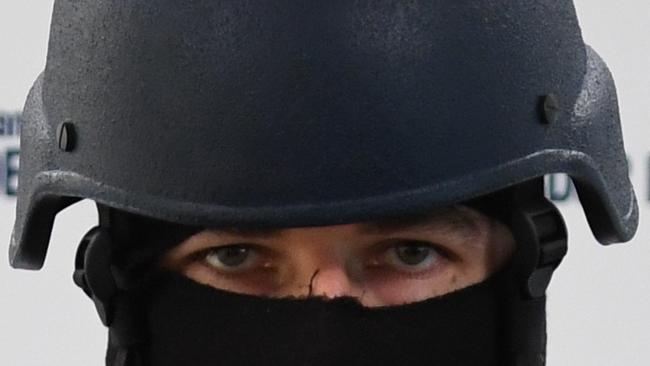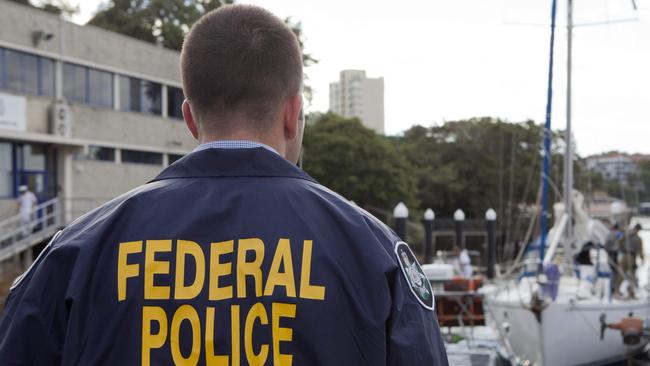Rare insight into one of the country’s most secretive organisations: the Australian Federal Police
IT'S a coveted role in one of Australia’s most secretive organisations, but agents are exposed to horrific things.

WARNING: Confronting content
EXCLUSIVE
IT'S a highly respected and desired role in one of the most secretive organisations in the country.
But Australian Federal Police agents on the frontline are exposed to some of the most dangerous and horrific things imaginable, in a bid to keep ordinary citizens safe.
Almost 100 past and current AFP agents have broken ranks to speak to news.com.au about the extreme toll their work has taken on them amid a mental health crisis within the organisation.
One AFP agent, who spoke to news.com.au on the condition of anonymity, said there was “a lot of stuff the public doesn’t know about”.
“And it’s probably a good thing they don’t know about it,” he said.
“They’d be surprised by the amount of terror attacks that have been thwarted and stopped.
“There’s been a considerable amount.”
Collectively they have been exposed on-the-job to dead bodies of child asylum seekers floating in open waters; gruesome war crimes including beheadings; international abductions and recovery operations; and have formally identified victims of flight MH17 and overseas terror attacks.
AFP agents and protective service officers, some with secret clearance, work in a range of operational areas including child protection, counter terrorism, and human trafficking, people smuggling and transnational crime investigations. Others are deployed to volatile countries on advisory and peacekeeping missions.
In a statement to news.com.au the AFP said it “continues to maintain that the health and wellbeing of our people is the highest priority”.
“The strength of our organisation is vital in continuing to protect the Australian community. This is, and remains, our key area of focus for the future,” the AFP said.
“The AFP Commissioner has publicly acknowledged there have been issues with our culture in the past, and is committed to addressing these issues wherever they may arise.”
‘I’VE WATCHED A MAN TEAR HIS SKIN APART’
Australia has a Memorandum of Understanding agreement with many Asian countries which often requires AFP sworn members to be deployed overseas for disaster response and international policing assistance. Several AFP agents told news.com.au that it was on overseas deployments where they were exposed to the most traumatic and dangerous situations.
“Because Australia is the bigger nation in the (Asia Pacific) area we get tasked with the job of assisting other countries (following incidents) like MH17, the Bali bombings, Christchurch earthquake, civil unrest in Timor and the Solomons,” one former AFP agent said.
“We have a lot of roles within that but one of them is to help identify victims’ bodies for Australia and our partner countries.
“We also get called into the middle of violent mob attacks and riots because, unlike the Australian Defence Force, we can (legally) discharge firearms if there’s an imminent (prospect of) death and serious injury to self or other.
“Defence can only fire if fired upon.”
Another AFP agent described working on the frontline as “the loneliest sport in the world”.
“I have arrested murderers, been involved in fatal pursuits, seen kids thrown by their parents across a room, watched a man tear his skin apart — that was work,” she said.
“I have worked in third world countries, had victims’ brains on my police jumper — that too was work.
“I have been close to shooting a man with three knives stashed upon him.”
The AFP has valid reasons for keeping its operations secret, particularly those involving national security, but many members claim their silence and lack of professional welfare support comes back to bite them in later years.
“A lot of the guys defending the areas they’re in are bound by secrecy to keep them safe and their families safe,” one AFP agent said.
“There’s guys undercover for years and years and they can’t say a thing.
“It’s their job to keep quiet (when under cover for investigations into) counter terrorism, bikies, child exploitation, child sexual abuse, people smuggling, to name just a few.”

‘I WATCHED HUNDREDS OF BEHEADING VIDEOS’
One AFP agent who worked undercover and in counterterror operations said the disturbing things he saw on the job constantly played on his mind.
“I was involved in the recovery effort and investigation of a crashed boat on Christmas Island, seeing multiple dead bodies lined up on the ground,” he said.
“As a rookie, my team and I were forced to work in a large counterterror investigation, with two or three of us being solely responsible for reading and watching all of the gathered electronic evidence, including hundreds of beheading videos.
“While I was able to complete my role without any issues, I now cringe at the sight of a person standing behind a person holding a sword or knife. It was not an issue before. Now it is.”
Other AFP agents told of seeing dead asylum seeker children floating in the ocean and stored on boats; being almost decapitated negotiating with a woman in crisis; fighting for their lives as mass riots broke out on deployments in the Solomon Islands; and working alone in a hostile environment in response to the Taliban kidnapping of an Australian aid worker in the Middle East.
“The stress I’ve been placed under has seen me attempt suicide ... and self-harming,” one AFP hostage negotiator said.
The whistleblowers are among almost 100 past and active AFP agents who have come forward on the condition of anonymity to highlight a mental health crisis and lack of welfare support in the AFP, as exposed by news.com.au this month.
“It’s the way they’re retrained, the images they see, the things they hear, the risk factors: this could happen, that could happen, you’re always on edge,” one AFP agent said.
“They’re training them to this high level of responsiveness, then when they’re broken or no longer in workforce they’re not training them down. A lot of people have a delayed response to PTSD.”
‘WE NEED SOMEONE TO TALK TO IN PERSON’
There are more than 6000 AFP members — 3481 of those are sworn — nationwide.
An AFP spokesperson said the organisation “acknowledges first responders are at higher risk of trauma-caused mental injury than almost any other profession”.
According to a statement from the AFP, the organisation employs two social workers, “5.6 full time equivalent” psychologists and “4.4 fulltime equivalent nurses” — all based in Canberra.
But AFP members outside of Canberra do not have face-to-face access to qualified psychologists through the organisation. They are instead given a number for over-the-phone support from any one of 658 outsourced psychologists and 132 registered social workers through Davidson Trahaire. A Confidant Network made up of volunteers and AFP members is also in place to “provide guidance to staff on options for professional support if needed”. According to the AFP, it also employs seven chaplains across the country.
“There is also one part-time Family Support Officer based in Canberra, who is available for families of members deployed with International Operations and ad hoc government response to large scale disasters such as the downing of MH17,” an AFP statement read.
But many AFP agents have criticised the services, labelling them ineffective and impersonal. They say they need face-to-face access to qualified psychologists so they don’t have to “retell (their) stories to a different person every time (they) call”.
“We need someone to talk to in person who is qualified in psychology and who understands the nature of issues AFP agents deal with ... it’s not that complicated,” a sworn member said.
Independent senator Nick Xenophon told news.com.au he would raise the “serious allegations about how [the AFP] manages its employees” at the next Senate Estimates, which could lead to an inquiry.
A change.org petition has been started to push for an inquiry into the mental health crisis and alleged bullying in the AFP.
Australian Federal Police Association president Angela Smith said she would support an inquiry into the AFP and has called on agents to report their issues to her.
If you or someone you know needs help, phone Lifeline on 13 11 14, Beyondblue on 1300 22 4636 or the 24-hour Suicide Call Back Service on 1300 659 467.




